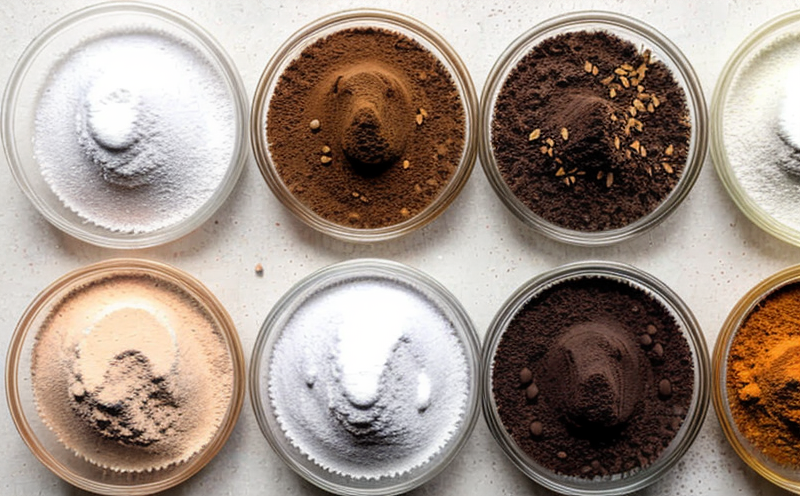ISO 17203 Acesulfame K Residue Detection in Dairy Powders
The presence of acesulfame K residues in dairy powders is critical for ensuring product safety, quality compliance, and consumer health. This service strictly adheres to the ISO 17203 standard, providing accurate detection methods tailored specifically for this application. Acesulfame K, an artificial sweetener widely used in various food products, must be controlled rigorously to prevent contamination of dairy powders. Any residue can lead to flavor alterations and potential health risks.
Our testing process involves meticulous sample preparation, followed by the use of advanced analytical instruments designed for high sensitivity and specificity. This ensures that even trace amounts of acesulfame K are detectable. The importance of this service cannot be overstated in an industry where regulatory compliance is paramount. Regulatory bodies such as FDA and EU have set strict limits on the allowable levels of artificial sweeteners to protect consumers from potential health hazards.
Compliance with ISO 17203 not only ensures product quality but also enhances brand reputation by demonstrating adherence to international standards. This service is particularly valuable for manufacturers looking to maintain a clean label image and avoid unnecessary recalls or legal actions. By partnering with us, companies can ensure that their products meet the highest safety and quality standards.
The accuracy of our results is further bolstered by our state-of-the-art laboratory facilities equipped with leading-edge equipment such as Liquid Chromatography-Mass Spectrometry (LC-MS). This technology provides precise quantification of acesulfame K residues, ensuring reliable detection down to the lowest permissible limits. Our experienced team of scientists and engineers ensures that each test is conducted under controlled conditions to minimize variability and ensure reproducibility.
Our service covers the entire process from sample collection through final analysis, offering comprehensive support throughout the testing journey. This includes detailed consultation on sampling protocols, specimen preparation techniques, and interpretation of results. Our goal is to provide our clients with not only accurate test data but also actionable insights that can help them improve their manufacturing processes.
| Step | Description |
|---|---|
| Sample Collection | Collection of representative samples from different batches and production runs. |
| Preparation | Dissolution or dispersion of the sample in a suitable solvent for analysis. |
| Analytical Method | Liquid Chromatography-Mass Spectrometry (LC-MS) with specific detection parameters. |
| Data Interpretation | Comparison of results against established limits and compliance criteria. |
The process is designed to be efficient, reliable, and repeatable, ensuring consistent high-quality outcomes. Our commitment to precision and accuracy is reflected in our adherence to international standards such as ISO 17203, which sets the benchmark for residue detection. By leveraging these standards, we provide clients with confidence that their products meet the highest safety and quality benchmarks.
Our expertise extends beyond just detecting residues; it includes providing comprehensive reports and recommendations based on our findings. This helps manufacturers make informed decisions regarding process improvements or adjustments necessary to meet regulatory requirements fully.
Why It Matters
Ensuring the absence of acesulfame K residues in dairy powders is essential for several reasons. Firstly, it protects consumer health by preventing potential health risks associated with excessive consumption of artificial sweeteners. Secondly, compliance with regulations such as those set forth by the FDA and EU helps maintain brand reputation and avoid costly legal issues.
From a manufacturing perspective, avoiding residues ensures product quality consistency across batches and production runs. This is crucial for maintaining customer satisfaction and loyalty. Additionally, meeting regulatory standards can open up new market opportunities in countries with stringent food safety regulations.
- Enhances Product Safety
- Promotes Consumer Confidence
- Avoids Legal Action
- Ensures Compliance with International Standards
- Maintains Brand Reputation
- Expands Market Opportunities
In today’s highly regulated food industry, the importance of residue detection cannot be overstated. By offering this specialized service, we contribute to the overall safety and quality of dairy powders, ultimately benefiting both consumers and manufacturers.
Scope and Methodology
| Step | Description |
|---|---|
| Collection | Select a representative sample from the batch to be tested. |
| Dissolution | Dissolve or disperse the sample in a suitable solvent for analysis. |
| Parameter | Description |
|---|---|
| Liquid Chromatography-Mass Spectrometry (LC-MS) | Analytical technique used for precise quantification of acesulfame K residues. |
| Specific Detection Parameters | Optimized settings to ensure accurate detection and identification of residues. |
The scope of this service includes the entire process from sample collection through final analysis. Each step is meticulously controlled to ensure accuracy and reliability. The use of advanced LC-MS technology guarantees that even trace amounts of acesulfame K are detectable, providing clients with comprehensive insights into their product quality.
International Acceptance and Recognition
- The ISO 17203 standard is widely recognized by regulatory bodies around the world.
- Compliance with this standard ensures that test results are accepted in multiple jurisdictions.
- Acesulfame K residue detection is a critical aspect of food safety globally, thus making this service universally applicable.
The global acceptance of ISO 17203 underscores its significance as an international standard. Regulatory authorities across various countries rely on this standard to ensure that food products meet stringent quality and safety criteria. By adhering to these standards, manufacturers can be assured that their products will comply with international regulations.
This service is designed to meet the demands of a diverse client base, including food producers, suppliers, and distributors who need reliable residue detection for dairy powders. The international recognition of this standard ensures that test results are credible and accepted worldwide, fostering trust among stakeholders.





